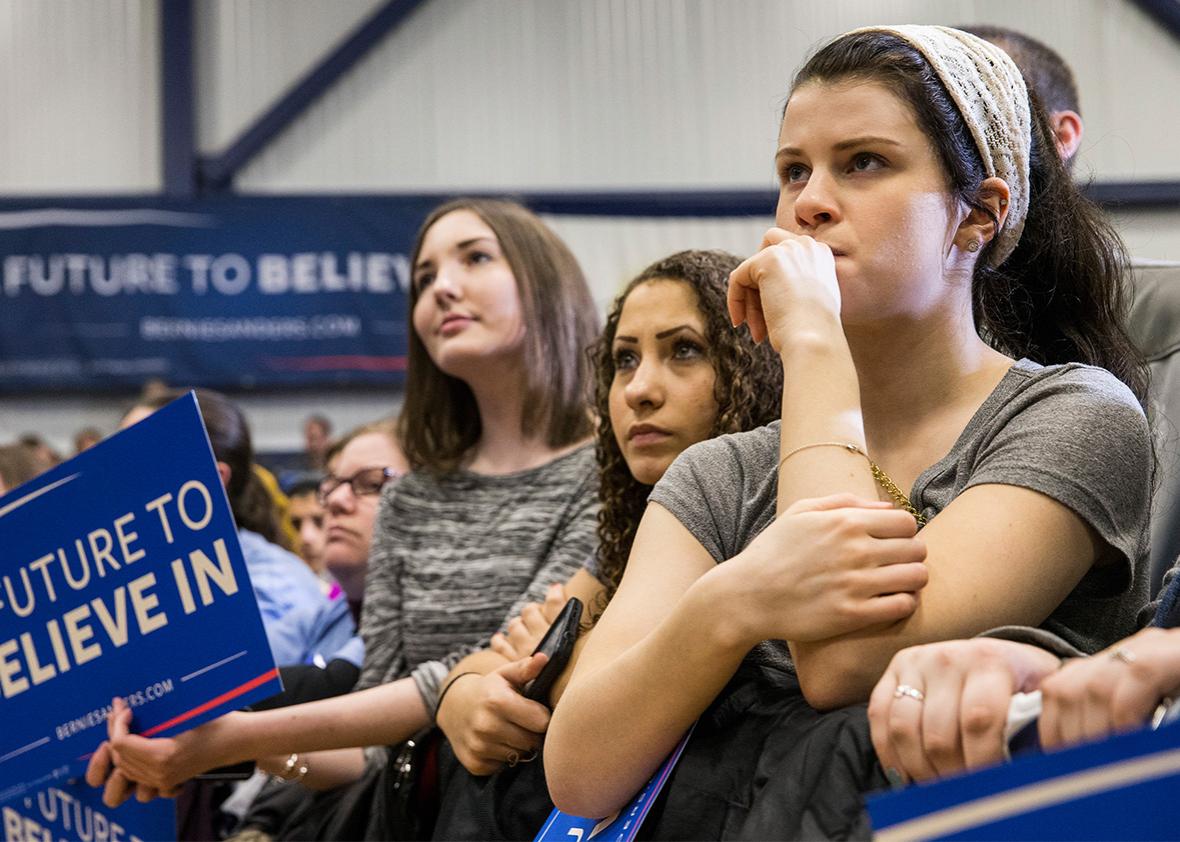That Democrats have a generational split in their presidential primary isn’t a surprise. Young Democrats flocked to Barack Obama in 2008, to Howard Dean in 2004, to Bill Clinton in 1992, and in one of the most famous examples, to George McGovern in 1972. What’s different about this primary is the size of the gulf between young Democrats and the rest of the party. Eighty-four percent of voters between 17 and 29 backed Vermont Sen. Bernie Sanders in the Iowa caucus, and in the latest New Hampshire polls, he leads Clinton by an almost 9-to-1 margin.
Despite the many, many takes on “millennial” disenchantment with Clinton, the why of her weakness isn’t as obvious as it seems. The big, obvious problem is that in Iowa and New Hampshire we have a narrow sample of young people to choose from. Between the two states, we are looking at a distinctive group of young, white, largely college-educated liberals whose left-turn is both surprising—in its speed and intensity—and predictable given events (the shock of the Great Recession) and the usual divides in the Democratic Party. (In her youth, for example, Hillary Clinton was fighting the “establishment” from the trenches of the McGovern campaign.)
Because we don’t know what young black and Latino voters believe about the contest between Sanders and Clinton—so far, there’s little polling from either South Carolina or Nevada—it’s hard to make firm electoral conclusions about Clinton’s weakness and Sanders’ strength, although it is clear that we are witnessing a real ideological shift in the Democratic Party that will play out in the next 20 years. With that said, we can still glean insight from the divide, and try to pinpoint—in particular—the source of Clinton’s weakness. And to that point, I asked around. For young participants in presidential politics, what was the problem with Hillary Rodham Clinton? What was so off-putting?
Speaking to students attending a Clinton event at Manchester Community College, the big answer was Wall Street. “I’m concerned with her talks with Goldman Sachs—the big money that is behind her,” said Sarah Kocher, who was there with a group from Hofstra University in New York. By contrast, she admired Sanders’ stance against “the big money and the banks.” “Bernie is very honest,” she said.
“I think a lot of us are starting to realize that Hillary is just part of the establishment,” said Kate, another student from the same group, whose only hesitation on Sanders was his ability to deliver on his promises.
Another group of students—who had come out of curiosity—sounded a similar note. “I get the impression from Hillary that as soon as she gets in office … she wouldn’t be an effective president,” said Michael Hathaway, “and if she was effective, it wouldn’t be for me, it would be for her banker friends who were giving her millions of dollars.”
Sitting next to Michael was Lexis, who had less to say about Clinton’s ties to Wall Street, and more to say about her campaign appeals. “I have a very large problem with the fact that a very large part of her campaign is riding on the fact that she’s a woman, and expects people like me—women—to vote for her,” she said. She continued: “All I have heard so far is ‘I’m a woman vote for me, because we need a woman president.’ We’ll have plenty of time in the future for women to run, for qualified, worthy women to run. We need to get over this concept of immediate gratification that’s driving this campaign.”
What’s striking in all of this is how visceral the dislike is, especially since Hillary—while important—isn’t a central figure in the story of American politics since the end of the George W. Bush administration. She backed the corporate-friendly policies that young Democrats are rebelling against, but she isn’t responsible for them.
I don’t have an explanation here, but I have a theory. It’s obvious that the left turn among young voters is a product of the Great Recession. For Americans who left high school or finished college in 2008, 2009 and 2010 (I’m part of this group, for the record), the economy was a wasteland, with little opportunity and tremendous competition. Young people—and especially college graduates—were promised a pathway into the middle-class and received, instead, a dead end.
Clinton isn’t responsible for this state of affairs, but she comes out of a governing class that played a large and important part in letting it happen. And while she has moved to the left to accommodate the concerns of younger voters, she’s still tainted by her history. That this is complicated—that it interacts with her gender in important ways—is almost irrelevant, as evidenced by the resistence to her gendered appeals.
What matters is that to these young voters Hillary Clinton was on the wrong side when it mattered. And that Bernie Sanders, as flawed as he might be, wasn’t.
